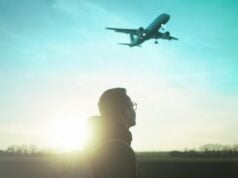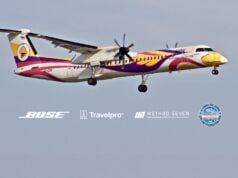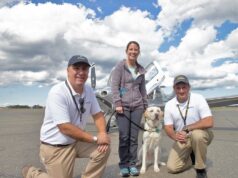
Leonardo Da Vinci is best known for his art and his appreciation for the indisputable evidence between science and nature. “Once you have tasted flight, you will forever walk the earth with your eyes turned skyward, for there you have been, and there you will always long to return.” His famous quote is held dear and repeated frequently as a reminder to those who have worked in aviation that the industry can be extremely volatile but resilient. Over the last decade, the race for innovation and advancement in technology has become challenging, exciting and rewarding. Technology has made a significant impact on many individuals and businesses yielding positive results, creating demand and providing prospective employment opportunities. The rise in middle-class families coupled with economies heavily dependent upon each other have resulted in significant demand for air travel.
Many of today’s aviation professionals witness the impact of a severe pilot shortage and the potential harm to national security. The pilot shortage is downplayed by some as a “pay shortage” — not necessarily a pilot shortage. But, according to Boeing, there are 44,000 new aircraft orders over the next 20 years with a requirement for approximately 800,000 new airline pilots worldwide! Additionally, there are opportunities for those prospective candidates in Parts 91 and 135. The International Monetary Fund (IMF) provides clear evidence that the uptick in world economies over the last decade, has been impressive. But what happens when there is a sudden stall in the world due to financial crisis and/or pandemic?
In early March 2020, the world seemed to come to a screeching halt due to the spread of the coronavirus from its origins in Wuhan, China. The coronavirus (and its resultant illness, COVID-19) has decimated individuals and businesses – especially in travel and tourism. The shifts in human behavior have severely impacted societal norms. The thirst to produce a vaccine to crush the coronavirus has resulted in many pharmaceutical companies standing in solidarity in the hope for an emergency FDA approval within the next few months.
From an aeronautical perspective, cities and national borders have been forced to close across the globe; corporate businesses have limited air travel for executives as world economies have stalled. Many pilots, flight attendants and airline professionals have been furloughed and encounter a current lack of opportunity in the fields for which we have such passion. Demand for pilots was reduced to virtually zero in March 2020. The idea of thousands of highly qualified airline pilots without a job in 2020 would have been a tease this time last year. Many carriers offered sign-on bonuses up to $60,000 and that alone still did not satisfy the demand for crews. So, where does this leave many of those who have been furloughed with limited experiences beyond flying?
Unlimited Visibility
Do not limit yourself. The coronavirus pandemic has impacted humanity overall, including our thought processes. In modern society, each of us seeks confirmation that our households, careers, endeavors, and society will thrive without challenge. While that would be a universal joy, it is simply not reality. Research conducted by CNBC’s Make It explains the cyclical nature of the economy and that an economic downturn is likely to happen about every ten years. Travel, tourism and hospitality are most vulnerable in these circumstances. Options need to be identified.
Consider stepping outside your “comfort zone” to find options for yourself. Our distinct personality traits may point us in the direction of new opportunities beyond the obvious. In view of the severe impact upon the aviation industry, some experts,including the International Air Transport Association (IATA), have concluded that air travel will take about two years to mirror 2019 travel counts. A key ingredient in overcoming any downturn and adjusting to the shift in human behavior is to always have an alternative occupation at the ready. Following are some suggestions that you might consider examining.

- Flight Instructing – As we continue to navigate through the pandemic and recovery process, flight instructing can certainly ease the burden and provide professional visibility.
- Retrace your steps. Most Airline Transport Pilots (ATP’s) are familiar with the FAA regulation mandating 1500 hours total time to fly for an air carrier (14 CFR/61.159). Since the law was enacted in 2013, the most common route toward ATP was to flight instruct, requiring a Certified Flight Instructor Certificate (CFI). It is imperative that this certificate NOT expire or the Instructor will have to repeat the entire course and comply with all examination requirements.
- Flight Instructing can sharpen an airman’s skills through proficiency and provide a way to build a solid network at local airports and FBOs.
- United States Customs and Border Protection (CBP)
- CBP relies on individuals with integrity to carry out the mission – to protect.
- Career opportunities are vast, including K-9 Inspection, Special Response Team, Horse Patrol and much more. Federal employee benefits encompass competitive pay, paid time off, health and life insurance with a generous retirement plan.
- For more information, visit the CBP website at https://cbp.gov

- Drone Pilot – Drone operations is a growing industry providing services to many areas including real estate, manufacturing, disaster relief, entertainment, utilities and many, many more.
- Among the companies growing this field is Aquiline Drones, based in Hartford, Conn. This company is reputed to be the fastest growing U.S.-based drone and cloud company. Aquiline Drones alone is seeking to add ONE MILLION new jobs in the United States. In addition to its domestic technical operations, it has three large technology teams in Asia, Europe, and South America. Aquiline Drones has launched a new employment initiative called Flight to the Future (F2F) to help many pilots and others reset their careers by training to become Certified Commercial Drone Operators.
- Generally speaking, income, like the Uber model, is rooted in the gig economy.
- For example, Aquiline Drones pays $150 minimum per hour, two hours per job = $300. This can translate into a six-figure annual income with two jobs per day, five days a week, with 2 weeks off. (For more information, please visit https://aquilinedrones.com.)
- Education – This sector can be extremely rewarding that also provides leadership skills through service to the community and to the next generation.
- With a looming teacher shortage wreaking havoc across the United States, educators are widely sought. Requirements for full-time educators differ between states, however many bachelor’s or master’s degrees may be sufficient within specific subjects.
- Salaries have increased across the country.
- Educators often play crucial roles in students’ lives as they become role models. They have the opportunity to influence through their personal bonds, shared creativity and much more.
- The quality of life for an educator is championed owed to the education calendar with holidays off and in many areas, freedom in summer.
- Substitute teachers are responsible for providing instruction and managing classroom environments in absence of the primary teacher.
- Provides ultimate flexibility.
- Long-term positions are available for those who meet specific credentials and are compensated at a premium daily rate.

- Real Estate – A realtor is a real estate professional who is a member of the National Association of Realtors (NAR). The real estate industry can be divided into several different sectors:
- Development
- Sales and marketing
- Brokerage
- Property management
- Lending
- Professional services (law, accounting, etc.)
How to become a real estate agent is a question more than 14,000 Americans Google each month. As a real estate agent, providing proper care, guidance, and confidence to clients is paramount to your success personally, professionally, and financially. Establishing a career in real estate require a significant effort through building a reputation with advertising and social media, harnessing established friendships, working with Chambers of Commerce, and much more. According to the Bureau of Labor Statistics, real estate agents earn an average of $45,610 per year with the top tier earning well above $100,000. While there are series of prerequisites, the first two will ignite the process:
- Taking a pre-licensing course: Learning real estate principles (terms like “lien, “escrow” and “encumbrance”), real estate practices (how to determine a property value), and the legal aspects of the business. The cost for the course is between $200-300, and more information can be found on your state’s real estate commission website.
- Licensing exam: Exams are typically divided into two portions – federal estate laws and general real estate principles, and the other, state specific laws. Both portions consist of 60-100 multiple-choice questions for which practice exams will be provided in the pre-licensing course.

- Aircraft Detailing
- Although prior experience is not necessary, aircraft detailers possess extensive knowledge, tools, and products that are recommended through the FAA and aircraft manufacturers to ensure standards are met. Detailing services are more commonly found at smaller, local airports in metropolitan cities when compared to major airports that require an Environmental Protection Agency (EPA) permit. Moreover, detailing services are split into two categories: exterior and interior. Depending on the aircraft, services can cost up to thousands of dollars. In some cases, hangars are required for quality work, such as painting and waxing which mandate a costly insurance policy.
- Pilots are most preferred for employment for a variety of reasons, which include familiarity across FBOs helping to promote networking opportunities. Additionally, most have experience in the General Aviation sector and understand the characteristics of an airplane. According to ZipRecruiter, the average salary for an aircraft detailer starts at $30,000 but can be significantly higher with effective advertising and other efforts to promote the business. More information on aircraft detailing can be found by emailing John Randolph at gudpilot@gmail.com
- Launching a business
- The coronavirus pandemic has transformed each household to assess its reliance upon employers. According to the Wall Street Journal, applications for new United States businesses are rising at the fastest rate since 2007. An economist at the University of Maryland, John Haltiwinger states, “This pandemic is actually inducing a surge in employer business startups that takes us back to the days before the decline in the Great Recession.”
- A proper business plan is a blueprint that will guide your business from the start-up phase through establishment and growth, which can yield an impact on the local economy. Business ownership can result in a great quality of life.
- Research, planning, and structure are some of the basic steps necessary for beginning the process.
- Is there a need for my products/ services?
- Can I identify a specific clientele?
- Are there competitors offering the same?
- How can my products/services become premium?
- How attractive is my location and business name?
- Social media is paramount for advertising.
To recapitulate, the COVID-19 pandemic has decimated many families and businesses across the world. The U.S. Center for Disease Control emphasizes that the mental health impact of stay-at-home and social distancing orders has caused a shift in human behavior. Although our modern society is resilient in recovery strategies, human behavior and philosophy has changed course overall. The travel, tourism, and hospitality industries are among the most vulnerable in any economic downturn which can cause severe consequences upon their dependent households without an alternative readily available to exercise. Each of us is wired differently, with distinct personality traits and strengths that can help us succeed. We should work toward identifying and pursuing opportunities that diversify our skill sets and add credentials to our résumés.
Publisher’s note: We would love to hear what measures you are taking to reroute your career. Please write us at info@aerocrewnews.com. We hope to continue to develop this theme in future issues.





























































































































Curious if these numbers from Boeing were pre-pandemic projections or post-pandemic?
“But, according to Boeing, there are 44,000 new aircraft orders over the next 20 years with a requirement for approximately 800,000 new airline pilots worldwide!”